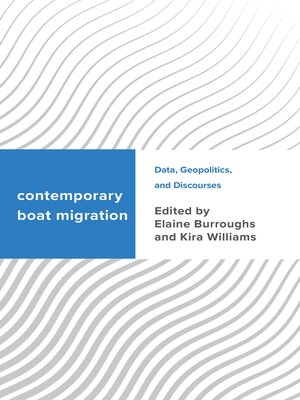Contemporary Boat Migration
ebook ∣ Data, Geopolitics, and Discourses · Challenging Migration Studies
By Elaine Burroughs

Sign up to save your library
With an OverDrive account, you can save your favorite libraries for at-a-glance information about availability. Find out more about OverDrive accounts.
Find this title in Libby, the library reading app by OverDrive.



Search for a digital library with this title
Title found at these libraries:
| Library Name | Distance |
|---|---|
| Loading... |
This book explores contemporary migration by boat through the intertwined, and under-explored, elements of empirical data, governance and geopolitics, and discourses.
While the migration of people by boat is a long-standing phenomenon, journeys have become more frequent and precarious as states illegalise entry. As migration at sea becomes more common, it has gained attention from a range of actors, including enforcement authorities, political elites, media, and non/inter-governmental organizations. The sea has thus become a space of hope/desperation for migrants as well as conflict over territory and sovereignty, representing wider social debates in and beyond Australia, Canada, the European Union, and the United States. Current literature on migration by boat reflects these debates, primarily concentrating on the humanitarian and legal realities of migration by boat and border enforcement at sea , however, few studies have analysed their empirical relationship. This edited volume aims to fill this gap and thereby address three important, overlapping aspects of these debates.
The first theme will explore data and methods on migration by boat, its discourse, and its enforcement, and in addition identifying appropriate research methodologies and sources to gather these data. The second theme will build upon the first by focusing on the relationship between data on migration by boat and governance and geopolitics of the "border". Building upon the two themes already outlined,the third theme will identify and analyse how elite discourses represent migration at sea.
While the migration of people by boat is a long-standing phenomenon, journeys have become more frequent and precarious as states illegalise entry. As migration at sea becomes more common, it has gained attention from a range of actors, including enforcement authorities, political elites, media, and non/inter-governmental organizations. The sea has thus become a space of hope/desperation for migrants as well as conflict over territory and sovereignty, representing wider social debates in and beyond Australia, Canada, the European Union, and the United States. Current literature on migration by boat reflects these debates, primarily concentrating on the humanitarian and legal realities of migration by boat and border enforcement at sea , however, few studies have analysed their empirical relationship. This edited volume aims to fill this gap and thereby address three important, overlapping aspects of these debates.
The first theme will explore data and methods on migration by boat, its discourse, and its enforcement, and in addition identifying appropriate research methodologies and sources to gather these data. The second theme will build upon the first by focusing on the relationship between data on migration by boat and governance and geopolitics of the "border". Building upon the two themes already outlined,the third theme will identify and analyse how elite discourses represent migration at sea.







